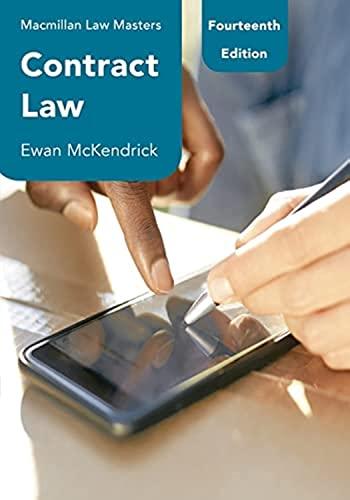Answered step by step
Verified Expert Solution
Question
1 Approved Answer
A. Product Liability (Chapter 20) A. Applies to business as i. Purchaser / user of goods that don't live up to expectations or cause damage
A. Product Liability (Chapter 20)
A. Applies to business as
i. Purchaser / user of goods that don't live up to expectations or cause damage (the business would be a plaintiff in a product liability lawsuit)
ii. Provider of goods that don't live up to expectations or cause damage (the business would be a defendant in a product liability lawsuit)
B. 4 "causes of action" / legal theories:
Warranty
- Requires "privity of contract" = the parties need to have entered a contract for the injured party to sue the provider for breach of warranty 2. 2 types of warranties: a._________________ i. Affirmation of ______ or __________ relating to goods ii. ______________ of goods iii_____________ or model b. __________________
- Warranty of ______________________
- Applies only to merchants = a person that deals in goods of the kind or otherwise holds itself out by occupation as having knowledge or skill peculiar to the practices or goods involved in the transaction (someone who is experienced and has special knowledge).
- 6 characteristic a__________________ b ___________________ c ___________________ d__________________ e___________________ f___________________
- Warranty of __________________________
- Goods are ________________________
- Seller must have reason to know of that intended use
- Warranty of ______________________
- Negligence
- Failure to exercise reasonable care. Most useful in two types of cases a. _________________________ b_________________________
- Normal cause of action when defendant = manufacturer of the product.
- Rarely applies to retailer and wholesalers
- Exception:the retailer / wholesaler labels the product as his own after assembling the product from component parts manufactured by others
- Advantage over warranty theory: ______________________
- Strict Liability
- Elements: a_________________________ b_________________________ c _________________________ d_________________________ e_________________________ (advantage over negligence theory, plaintiff does not have to prove "fault") f_________________________ (advantage over warranty theory) 2.Formation of strict liability (what a defendant will be liable for) is limited to _______________ harm.
Step by Step Solution
There are 3 Steps involved in it
Step: 1

Get Instant Access to Expert-Tailored Solutions
See step-by-step solutions with expert insights and AI powered tools for academic success
Step: 2

Step: 3

Ace Your Homework with AI
Get the answers you need in no time with our AI-driven, step-by-step assistance
Get Started


